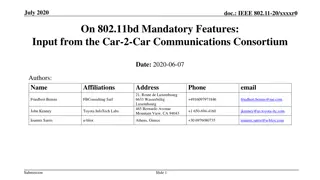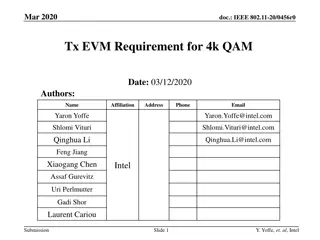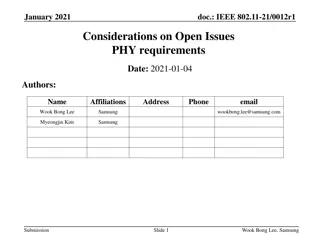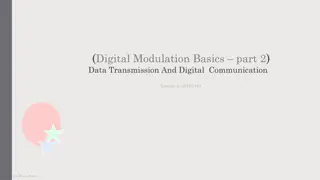Proposal for New 802.11bd 20MHz Mode for Enhanced ITS Interoperability
The document discusses the necessity of a new 802.11bd 20MHz mode for improved interoperability within Intelligent Transportation Systems (ITS) due to limitations with current Wi-Fi channels and the scope of 256-QAM modulation. It presents proposals approved by the Car-2-Car Communications Consortiu
0 views • 8 slides
IEEE 802.11-20/0456r0: Transmission EVM Requirements for 4k QAM
The document discusses the tradeoff between error vector magnitude (EVM) and transmission power in the context of 4k QAM modulation. It explores the EVM requirements for 4k QAM and addresses issues such as channel estimation errors, modulation and coding scheme (MCS) parameters, and degradation with
0 views • 11 slides
Understanding Performance Analysis of Digital Modulation Techniques
Explore the realm of digital modulation techniques such as ASK, FSK, PSK, QPSK, QAM, and more. Learn about bandwidth efficiency, baud rates, minimum bandwidth, and how to calculate them. Discover the importance of M-ary modulation and how it impacts data transmission rates and bandwidth requirements
4 views • 18 slides
IEEE 802.11-21/0012r1 Considerations on Open Issues in PHY Requirements
In the January 2021 document IEEE 802.11-21/0012r1, discussions were held on open issues related to PHY requirements, including LO requirements for 320 MHz transmission, EVM requirements for 1024 QAM and BPSK-DCM-DUP, minimum sensitivity for 4K QAM and BPSK-DCM-DUP, and channel rejection levels. Sug
0 views • 12 slides
MC-OOK Symbol Design for IEEE 802.11 - March 2018
Introducing MC-OOK waveforms with low peak-to-average power ratio for IEEE 802.11, utilizing 256-QAM modulation and 4 MHz bandwidth. The design methodology involves generating time-domain waveforms, transforming to frequency domain, and proposing symbols with and without DC subcarriers. Detailed sym
0 views • 20 slides
Introduction to Quadrature Amplitude Modulation (QAM) in Digital Communication
Quadrature Amplitude Modulation (QAM) is a widely used modulation technique for transmitting data signals onto a carrier in communication systems. It offers advantages like increased efficiency by combining amplitude and phase variations, making it suitable for various radio and data delivery applic
0 views • 15 slides





